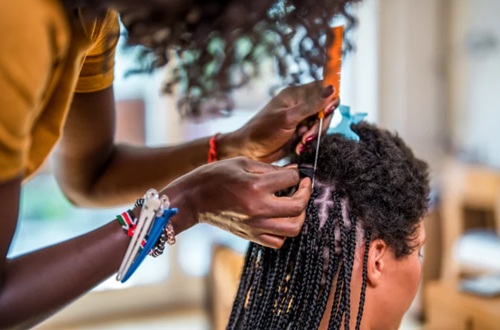Consumer Reports warns of cancer-causing chemicals in synthetic braiding hair products

A recent investigation by Consumer Reports has uncovered alarming levels of hazardous chemicals, including lead, benzene, and methylene chloride, in ten popular synthetic hair products widely used for braids, extensions, and other protective hairstyles predominantly worn by Black women.
The tested products—sold under brands such as Magic Fingers, Sensationnel, and Shake-N-Go—contained substances linked to cancer, reproductive harm, and developmental damage, raising red flags about the long-term health risks associated with extended use.
One package of braiding hair was found to exceed California’s maximum allowable lead dosage by over 600%, with nine out of ten products showing some level of lead contamination.
Benzene, a known carcinogen associated with acute myeloid leukemia, was also detected, as was methylene chloride, which the EPA links to liver and lung cancer.
The FDA prohibits methylene chloride in cosmetics, yet it was present in some samples.
“There is no safe level of exposure to lead or benzene,” said Alexa Friedman, senior scientist at the Environmental Working Group (EWG). “These are serious chemicals with serious health consequences, especially with prolonged use.”
Consumer Reports tested 20 samples from 10 synthetic hair products commonly made with Kanekalon, a plastic fiber produced by Japanese company Kaneka.
While Kaneka confirmed it manufactures the fiber, it stated it does not dye or finish the final products. Hair brands are responsible for those steps, where harmful chemical exposure is most likely introduced.
Magic Fingers and Sensationnel pushed back on the report’s methodology, claiming it does not reflect real-world product use, but both stopped short of denying the presence of the chemicals. Shake-N-Go declined to comment.
This study has reignited broader concerns about racial disparities in cosmetic safety. Black women are more frequently targeted by beauty products containing harmful chemicals, a trend spotlighted by recent lawsuits over hair relaxers allegedly linked to uterine cancer. A 2022 class-action suit accused major relaxer brands of marketing carcinogenic products disproportionately to Black consumers.
According to EWG’s own research, more than 4,000 personal care products marketed to Black women were found to be moderately to highly hazardous. Friedman warned that regular exposure to even small amounts of harmful chemicals—especially when layered across multiple products—can have cumulative health effects.
“Everyone deserves access to safe products,” she said. “Manufacturers should prioritize consumer safety over profits.”
Consumers are being urged to consult databases like EWG’s Skin Deep, which rate personal care products by toxicity level, and to pressure companies and regulators to enforce stricter safety standards.





